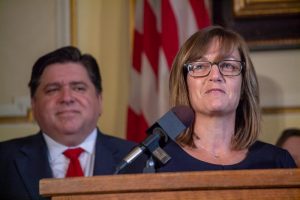New state law bans ‘dark money’ in judicial races
By Peter Hancock Capitol News Illinois — November 17, 2021
Rep. Katie Stuart, D-Edwardsville, speaks at a news conference in Gov. J.B. Pritzker’s office. (Capitol News Illinois file photo)
SPRINGFIELD – A new law in Illinois aims to ban out-of-state contributions and so-called “dark money” in judicial campaigns by requiring all candidates to disclose the sources of their contributions.
Gov. J.B. Pritzker on Monday, Nov. 15 signed Senate Bill 536 into law, an omnibus elections bill that makes a number of other changes to the way elections are conducted.
Under the bill, no judicial campaign committee is allowed to accept contributions from any out-of-state source or any person or entity that does not disclose the identity of those making the contribution, except for contributions that are below the threshold for itemizing.
The bill also raises the threshold for itemizing contributions to $1,000, up from $500.
It also prohibits people from making or accepting anonymous contributions or contributions made in someone else’s name.
Democrats pushed the bill through the General Assembly on the final day of the fall veto session. It came about partly in response to the 2020 elections in which Supreme Court Justice Thomas Kilbride, a Democrat, was defeated for retention, the first time in state history that a state Supreme Court justice failed to win retention.
During that campaign, a group called Citizens for Judicial Fairness spent more than $5.9 million on a campaign to defeat Killbride, $4.5 million of which came from Chicago billionaire Ken Griffin, founder of the hedge fund Citadel LLC, according to campaign finance reports. Those types of donations would be unaffected by the new law.
But the campaign also received hundreds of thousands of dollars from so-called dark money groups, including the Judicial Fairness Project, which does not disclose its donors.
Kilbride’s own campaign spent nearly $4 million on his behalf, mainly from labor unions, trial lawyers and the Democratic Party of Illinois.
“Trying to avoid dark money in elections, I think is something that we can all get behind” Rep. Katie Stuart, D-Edwardsville, said during debate on the House floor. “So the change would stop out-of-state and untraceable money from finding its way into our judicial races to maintain the integrity of those judicial elections.”
Republicans, however, argued that it was a partisan maneuver designed to help Democrats protect their current 4-3 majority on the court.
“I can’t help but notice that the impetus for great changes in how we conduct elections for the judiciary in the state of Illinois — both the remapping of the Supreme Court (and) the change in campaign finance activities — comes after, for the first time in the history of our state, a Democratic Supreme Court justice lost his retention in the 2020 election,” said Rep. Ryan Spain, R-Peoria. “So, in my opinion, this is another effort for the majority to change the rules of the game because they don’t like the outcome.”
A number of other changes in the bill relate to filing deadlines to coincide with the change in the 2022 election cycle when primary elections will be held in June instead of March due to the delay in the release of 2020 census data and the passing of new congressional district maps.
But the new law also includes other changes, including one giving voters the option of identifying as male, female or non-binary on their voter registration applications so their gender identity can match what appears on their passport or driver’s license.
It also allows people to apply for permanent vote-by-mail ballots year round. And it requires all polling places to have at least one polling booth that is wheelchair accessible.
Another provision creates a new 15-member task force to “review current laws and make recommendations to improve access to voting for persons with disabilities.”
That task force is to submit a report to the State Board of Elections by Aug. 1, 2022, summarizing the laws and resources available to persons with disabilities, and a separate report to the governor and General Assembly by Dec. 15 on recommendations for changes in current law or recommendations for election authorities.
The bill passed both chambers of the General Assembly along partisan lines, 72-42 in the House and 41-17 in the Senate.
phancock@capitolnewsillinois.com







